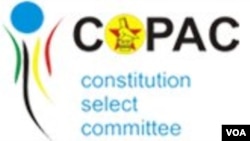WASHINGTON —
The select committee responsible for the country’s new constitution, COPAC, on Thursday endorsed the constitutional draft, paving the way for the charter to be introduced to parliament for final analysis.
The draft will then be put before a referendum. Unity government politicians think the draft will be supported by the generality of Zimbabweans but some are criticizing the document as safeguarding the interests of politicians and not the country.
Critics, including the National Constitutional Assembly (NCA), charge that the draft is a mirror of the current Lancaster House Constitution.
One of the main issues on the table is the executive functions of the president.
In Chapter Five (Part 4, Section 110) of the draft constitution, powers given to the president that are regarded as 'normal practice' worldwide include deploying the defence forces and the appointment or removal of ministers and deputy ministers.
Critics charge that the powers given to the president in the draft constitution are more than those in the current constitution and less limited.
VOA spoke to NCA spokesman Madock Chivasa and COPAC co-chairman Douglas Mwonzora on the opposing views of the draft constitution.
Mwonzora explained that there are also checks and balances in the draft constitution which are designed to maintain transparency, a change from the Lancester Constitution.
“It provides the president with the powers to appoint his ministers, but it provides that if the ministers fail to deliver there can be a vote of ‘no confidence’ in that government,” said Mwonzora
The draft reads in Chapter Five (Part 3, Section 109): " ... if parliament passes a vote of no confidence in the government, within 14 days the president must remove all ministers and deputy ministers from office; or dissolve parliament and, within ninety days, call a general election."
But critics like Chivasa said the draft which was a constitution compiled mainly by three parties rather than the people of Zimbabwe, "is a mirror image of the Lancaster House Constitution".
"It’s clear that the kind of arrangement in this constitution is the existing arrangement we are trying to run away from," said Chivasa
The charter is expected to be introduced to parliament soon for a final analysis.
The draft will then be put before a referendum. Unity government politicians think the draft will be supported by the generality of Zimbabweans but some are criticizing the document as safeguarding the interests of politicians and not the country.
Critics, including the National Constitutional Assembly (NCA), charge that the draft is a mirror of the current Lancaster House Constitution.
One of the main issues on the table is the executive functions of the president.
In Chapter Five (Part 4, Section 110) of the draft constitution, powers given to the president that are regarded as 'normal practice' worldwide include deploying the defence forces and the appointment or removal of ministers and deputy ministers.
Critics charge that the powers given to the president in the draft constitution are more than those in the current constitution and less limited.
VOA spoke to NCA spokesman Madock Chivasa and COPAC co-chairman Douglas Mwonzora on the opposing views of the draft constitution.
Mwonzora explained that there are also checks and balances in the draft constitution which are designed to maintain transparency, a change from the Lancester Constitution.
“It provides the president with the powers to appoint his ministers, but it provides that if the ministers fail to deliver there can be a vote of ‘no confidence’ in that government,” said Mwonzora
The draft reads in Chapter Five (Part 3, Section 109): " ... if parliament passes a vote of no confidence in the government, within 14 days the president must remove all ministers and deputy ministers from office; or dissolve parliament and, within ninety days, call a general election."
But critics like Chivasa said the draft which was a constitution compiled mainly by three parties rather than the people of Zimbabwe, "is a mirror image of the Lancaster House Constitution".
"It’s clear that the kind of arrangement in this constitution is the existing arrangement we are trying to run away from," said Chivasa
The charter is expected to be introduced to parliament soon for a final analysis.












